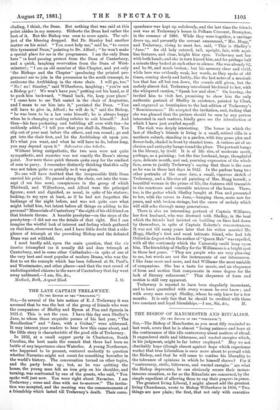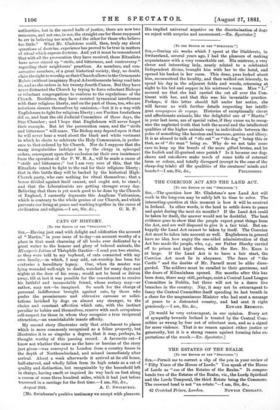THE BISHOP OF MANCHESTER AND RITUALISM.
[TO THE EDITOR OF THE " SPECTATOR."]
SIH,—The Bishop of Manchester, as you most fitly reminded us last week, avers that he is almost " losing patience and hope at the continuance of this idle controversy about matters of ritual. It engendered strife and bitterness, and wasted energies which, in his judgment, might be far better employed." May we not charitably hope (though almost against hope which experience works) that true Liberalism is once more about to prevail with the Bishop, and that he will cease to confine his liberality to the tolerance of opinions in which he himself shares ? For if "controversy, strife, bitterness, and wasted energies " are what the Bishop deprecates, he can obviously secure their instan- taneous cessation, so far as the Ritualists are concerned, by the simple expedient of allowing them to say their prayers in peace.
The greatest living Liberal, I might almost add the greatest living Churchman, wrote to Bishop Wilberforce in 1856, " Two things are now plain; the first, that not only with executive authorities, but is the sacred halls of justice, there are now two measures, and not one, in use, the straight one for those supposed to err in believing too much, and the other for those who believe too little." What Mr. Gladstone could, then, truly say about questions of doctrine, experience has proved to be true in matters of ritual which express doctrine. And yet it must be remembered that with all the provocation they have received, these Ritualists have never stirred up " strife, and bitterness, and controversy " regarding their neighbours' practices. As members, and con- servative members, of a great historical society, they, no doubt, claim the right to worship as their Church allows in the Ornaments Rubric (without imaginary Royal Advertisements being read into it), and as she orders in her twenty-fourth Canon. But they have never distracted the Church by trying to force reluctant Bishops or reluctant congregations to conform to the regulations of the Church. Doubtless, they have resisted tyrannical interference with their religious liberty, and on the part of those, too, who are notorious sinners themselves by omission,—but it is a way with Englishmen to fight for religious liberty ; our Puritan forefathers did so, and beat the old Judicial Committee of those days, the Star Chamber ; and I hope that Englishmen will never forget their example. But let the persecution cease, and the "strife and bitterness " will cease. The Bishop may depend upon it that he will never hear a word about the black and white vestment in which he elects to celebrate the Holy Communion, in prefer- ence to that ordered by his Church. Nor do I suppose that the many irregularities indulged in by the clergy in episcopal orders, consequent upon their exclusion (at their own insistence) from the operation of the P. W. R. A., will be made a cause of " strife and bitterness ;" but I am very sure of this, that the Ritualists intend to fight to the end for their religious liberty ; that in this battle they will be backed by the historical High- Church party, who care nothing for ritual themselves ; that a house divided against itself cannot, and ought not, to stand ; and that the Liberationists are getting stronger every day. Believing that there is yet much good to be done by the Church of England, I earnestly deprecate this Anglican Vaticanism, which is contrary to the whole genius of our Church, and which prevents our living at peace and working together in the cause of civilisation and religion.—I am, Sir, &c., G. R. P.































 Previous page
Previous page